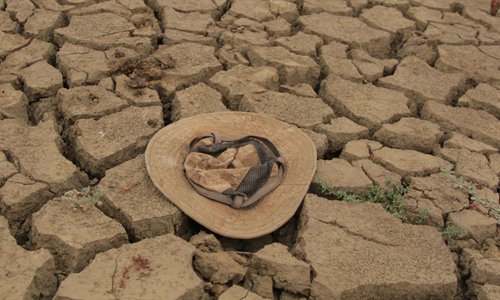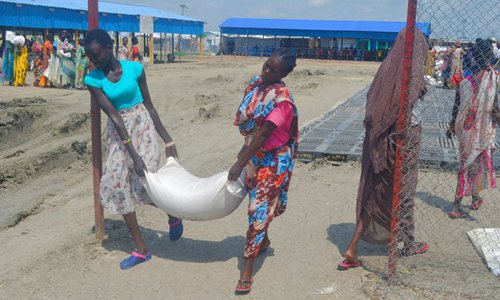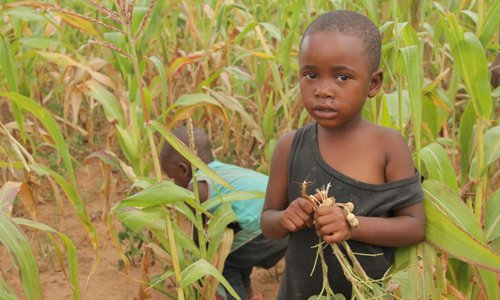Escalating hunger in Africa calls for more global efforts on food security

Photo taken on Oct. 11, 2019 shows the drought land in Mt. Darwin, Zimbabwe. (Photo by Shaun Jusa/Xinhua)
Peter Muganda and his elderly peers who reside in the low-income suburbs of Zimbabwe's capital Harare, could be facing starvation were it not for food ration provided by the government and donor agencies.
The 75-year-old pensioner who lives with his wife and three grandchildren, has benefitted from monthly donation of 20 kg of maize by the state to cushion him from hunger that is on the rise in Zimbabwe amid climate shocks and economic downturn.
"I have been receiving maize since May this year and it has ensured that my family takes a meal each day," Muganda told Xinhua. "It is not enough but at least we have somewhere to start from."
Muganda's homeland, which was for decades described as Africa's breadbasket, has not been spared hunger which threatens to roll back economic and social gains in the world's largest developing continent.
The latest Zimbabwe Vulnerability Assessment Committee Results indicates that about 5.5 million people in Zimbabwe face food insecurity, as scanty rains and erratic weather patterns have caused a negative impact on crop harvests and livelihood prospects.

People carry food rations donated by the World Food Program (WFP) at the Malakal Protection of Civilians site in Malakal, South Sudan, June 19, 2019. (Photo by Denis Elamu/Xinhua)
HUNGER ON THE RISE
Zimbabwe is not alone in shouldering the hunger burden that continues to weigh heavily on African countries despite concerted efforts to accelerate their socio-economic transformation.
Africa remains the epicenter of hunger with the State of Food Security and Nutrition in the World 2019 report indicating that out of the 2 billion people suffering from food insecurity globally, about 676 million are from the continent.
The report released in July by UN agencies attributed rising hunger in Africa to poverty, extreme weather events, conflicts and global economic volatility.
Hunger is continuing to rise steadily in almost all subregions in Africa. In Eastern Africa in particular, nearly a third of the population is undernourished, according to the report.
The eastern African region had 133.1 million undernourished people in 2018, followed by western and southern African regions that had 56.1 million and 5.3 million malnourished people respectively, the report said.
Meshack Malo, UN Food and Agriculture Organization (FAO) Country Representative in South Sudan, told Xinhua that climate change, instability and underinvestment in the agriculture sector are partly to blame for the hunger crisis in Africa.
"That is why we are emphasizing that peace is fundamental to eradicate hunger in Africa," said Malo, adding that Africa requires visionary leadership and adoption of climate resilient agriculture to overcome famine.
South Sudan and Somalia, which have borne the brunt of conflicts, displacements and natural calamities, are yet to overcome hunger and malnutrition that have disproportionately affected women and children.
The Intergovernmental Authority on Development (IGAD), a regional economic bloc, said in early September that about 6.1 million people in South Sudan or half of the country's population and an additional 2.1 million people in Somalia were grappling with acute food shortages.
"Investments in climate adaptation, conflict prevention and sustaining peace will save lives and livelihoods, reduce structural vulnerabilities and address the root causes of hunger and malnutrition," IGAD said in a statement.
The Greater Horn of Africa that covers countries including Kenya, Uganda, Somalia, Ethiopia, Sudan, Djibouti and South Sudan at the moment has an estimated 27 million people facing food insecurity, according to recent assessment by the IGAD.

Children play in drought-hit fields in Macheke, Mashonaland East Province, Zimbabwe, March 10, 2019. (Photo by Shaun Jusa/Xinhua)
AFRICA'S ENDEAVOR
The 23rd Assembly of African Union (AU) Heads of State and Government that took place in Malabo, Equatorial Guinea in June 2014 adopted a sweeping declaration on achieving the vision of a hunger-free continent.
During the summit, African leaders renewed their commitment to allocate at least 10 percent of national budget to agriculture and enact policies that aim to improve post-harvest management, value addition and market linkages.
Policymakers and experts agreed that African countries can seize the moment and turn the hungry continent into a prized breadbasket.
Abdoulaye Bio Tchane, Benin's minister of state for planning and development, told Xinhua that adopting new agricultural technologies, regional cooperation, policy reforms and investments in school feeding programs is key to achieving zero hunger in the continent.
Benin like many countries in the Sahel region is yet to overcome the hunger crisis with UN statistics indicating that a tenth of the country's 12 million population are food insecure.
Guy Mesmin Oyila Adoua, the World Food Program (WFP) representative in Benin, said that streamlining agricultural value chains from production, harvesting, storage and marketing could reduce the hunger burden in the greater Sahel region.
While hunger and malnutrition continue to harm many African countries, progressive leadership and policy reform are offering a silver lining.
Peter Smerdon, the spokesperson for WFP east Africa Regional Bureau based in Nairobi, said that political support for Africa's agricultural transformation agenda, conflict resolution, investing in climate smart agriculture and social safety nets for the vulnerable could help solve Africa's hunger challenge.
"The AU should leverage on its pivotal political role to end conflicts and instability that are key drivers of hunger in the continent," Smerdon told Xinhua, adding that intra-African trade could also provide a durable solution to the continent's endemic food insecurity.

Farmers go about their work at a high-tech agricultural industrial park in Abuja, Nigeria, Aug. 29, 2019. (Xinhua)
CHINESE IN HELP
China's success to feed around one-fifth of the world's population with just 7 percent of the world's arable land is of great value to Africa's quest to end hunger.
To help fight hunger globally, Chinese experts and entrepreneurs have shared their wisdom and experience and help those in need.
In a white paper on food security issued on Monday, China pledged to continuously support other developing countries within the framework of South-South cooperation, and promote the development of global food industry.
Green Agriculture West Africa Company Limited, a Chinese company specializing in seed production, has provided nearly 30,000 tons of improved rice and maize seeds to Nigerian farmers, helping increase local grain output by more than 1 million tons since 2013.
The company has also dispatched experts to help breed high quality millet varieties in Burkina Faso, which lies at the drought-prone Sahel belt.
China has also regularly assisted Zimbabwe with food aid and agricultural technology.
The China-Aid Agricultural Technology Demonstration Center set up in 2012 at Gwebi Agricultural College, 27 km northwest of Harare, has helped numerous local farmers to learn China's sophisticated farming practices and technologies.
"We're no longer suffering from hunger," said 55-year-old Georges Ranaivomanana, a Madagascan farmer who took the lead in planting Chinese seeds in his town of Mahitsy.
He told Xinhua that he hoped that all his compatriots would use the seeds to raise their living standards, and some day, his country might even be able to export rice to help other countries.